| Article ID | Journal | Published Year | Pages | File Type |
|---|---|---|---|---|
| 480944 | European Journal of Operational Research | 2011 | 10 Pages |
We consider a game Gn played by two players. There are n independent random variables Z1, … , Zn, each of which is uniformly distributed on [0,1]. Both players know n, the independence and the distribution of these random variables, but only player 1 knows the vector of realizations z ≔ (z1, … , zn) of them. Player 1 begins by choosing an order zk1,…,zknzk1,…,zkn of the realizations. Player 2, who does not know the realizations, faces a stopping problem. At period 1, player 2 learns zk1zk1. If player 2 accepts, then player 1 pays zk1zk1 euros to player 2 and play ends. Otherwise, if player 2 rejects, play continues similarly at period 2 with player 1 offering zk2zk2 euros to player 2. Play continues until player 2 accepts an offer. If player 2 has rejected n − 1 times, player 2 has to accept the last offer at period n. This model extends Moser’s (1956) problem, which assumes a non-strategic player 1.We examine different types of strategies for the players and determine their guarantee-levels. Although we do not find the exact max–min and min–max values of the game Gn in general, we provide an interval In = [an, bn] containing these such that the length of In is at most 0.07 and converges to 0 as n tends to infinity. We also point out strategies, with a relatively simple structure, which guarantee that player 1 has to pay at most bn and player 2 receives at least an. In addition, we completely solve the special case G2 where there are only two random variables. We mention a number of intriguing open questions and conjectures, which may initiate further research on this subject.
